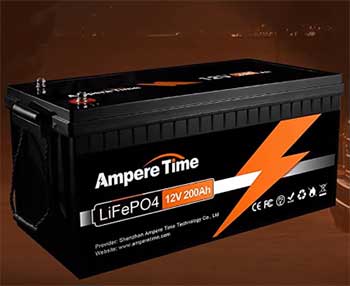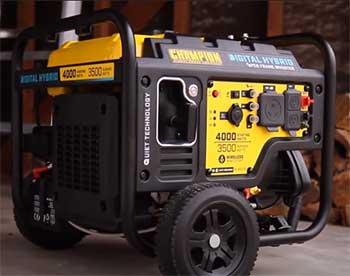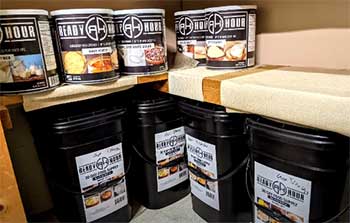RVs are heaven for free-spirited people. Power supplies for RVs used to be a concern, but lithium batteries and generators have changed that part.
Both are good power options, but there are some differences between them. Power supply duration, Convenience, environmental impact, and restrictions are the major differences.
There are lots of options for powering an RV. Lithium batteries and generators are the most common power sources. So if you had to pick, which one should you go for?
Here is a side-by-side comparison to help you decide.
A Quick Summary of Comparison
| Feature | Lithium Batteries | Generators |
| Power supply duration | Until it is out of charge, limited | Until it is out of fuel, almost unlimited |
| Convenience | More convenient | Less convenient |
| Environmental impact and restrictions | Less pollution and restrictions | More pollution and restrictions |
And that’s the gist of it, keep reading for the detailed breakdown!
Key Differences Between RV Lithium Battery And Generator
Lithium batteries and generators- both are trusty power supply sources for RVs. People usually combine them both, but what if you had to pick one? Where do you look for comparisons?
Power supply duration, convenience, environmental impact, and restrictions are the major differences between lithium batteries and generators. Let’s see how they work out in batteries and generators.
- Power Supply Duration

This is unsurprisingly the most important part of the whole debate.
How long the power lasts will depend on multiple things.
Generators run on fuel so the power lasts until the fuel is out.
As for batteries, it depends on the charge.
Lithium batteries used to last way shorter than generators. But things have changed, newer batteries can last as long as generators (sometimes even more).
But the supply is still somewhat limited unless you have a recharge source close by. You’ll either need a DC-to-DC source or solar panels.
Generators are somewhat better in this department, on paper at least. You’ll be getting power up until your fuel runs out or in some cases, falls below the ¼ capacity mark.
This used to be much longer than battery runtimes, but now batteries can rival this easily. The best part is that you won’t have to wait to recharge it. Just refill the tank and you’ll be good.
Also Read: Alternatives To 17TF Battery.
- Convenience
This is where Lithium batteries beat generators. They’re made in lots of sizes and they get as convenient as possible. You can carry them around or have them fixed in one spot.
Another good thing is, you won’t have to try multiple times to get the battery running. Once it is charged, it will start on its own.
Generators are a little more old-timey, so to speak. Some generators can be fixed in one place but not most of them. They can be easy to carry around with wheels and handles, but that’s already an extra hassle.
But there’s a twist. Lithium batteries can’t run all appliances. You’ll either have to give some things up or depend on a generator for them. This pretty much defeats the purpose, but at least the convenience is there.
- Environmental Impact and Restrictions
This actually matters more than you’d think. With global warming creeping up on us, reducing our carbon footprint is important.
Lithium batteries do a good job of that since they don’t run on fuel. They also make less noise and fumes so that’s a plus.
Generators unfortunately are the opposite. They’re noisy, make a lot of fumes and of course, run on fossil fuels. This is a primary reason why generators have more restrictions on them.
A lot of places don’t allow generators in RV parking spots because of the noise and fumes. Lithium batteries don’t have that problem so you’ll have fewer restrictions to worry about.
Which One Should You Choose?
The thing is, both lithium batteries and generators offer very similar benefits. They’re pretty much twins, so differentiating or comparing them is a little hard.

That means picking one from these two options is pretty hard too.
If you’re aiming for something you don’t have to carry around and can easily “recharge”, lithium batteries are really good options.
They’re as portable as it gets which is crucial for any RV component.
You can easily charge them from a power source when they run out so no need to worry about time limits.
The only problem is, lithium batteries have to be charged almost daily, and finding a source can be a little tough. You’ll have to find a DC-to-DC power source or go for solar panels. That is one extra hassle no one talks about.
If you’re focusing more on how long the power will last, generators are good options. They’re a little noisy and you’ll have to check the fuel level regularly, but they usually last longer than batteries.
You can also refill a generator easily so no need to worry about recharging.
The problem is, generators are notorious for polluting the environment. Since they run on fossil fuel, the carbon footprint is off the roof. Plus sometimes separate generators aren’t allowed in RV parking spots.
Overall, a lithium battery is the better option if you can manage the power source. A generator is good, but the restriction part is a little risky.
You can definitely combine both, but if you’re looking for only one pick then go with lithium batteries.
Also Read: Substitutes To Milwaukee Heated Jacket Battery.
Frequently Asked Questions (FAQ)
Here are a bunch of questions people ask about lithium batteries, generators, and RV power sources in general.
Most definitely yes. You just have to pick the right one with a good runtime.
Depends on how you travel. If you can manage a regular recharging source for your lithium battery, then the switch is very much worth it.
In pretty much every sense, yes. Just make sure to pick one with a good runtime.
Lithium batteries have to be recharged and some of them don’t last very long. You also can’t power everything with batteries, and you may have to install them before getting to use them.
Final Verdict
RV lithium battery and generator is a pretty intense debate. The right answer depends on how you travel and what your needs are.
For the most part, lithium batteries are the clear winner. But if you don’t mind the noise and potential restrictions, a generator is a very good option too.

